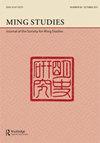The Book of Swindles: Selections from a Late Ming Collection
IF 0.3
0 ASIAN STUDIES
引用次数: 2
Abstract
ity and aplomb; Zhang Jing, for example, does a fine job of presenting Sessions 5 and 6 in fluid and natural English, and Robert Hegel and Xu Yunjing handle skilfully the poetry in Session 10. Just occasionally, however, the translation falls short of an elegant and fully idiomatic rendering of Aina’s expressive yet economical language. Part of the problem is that the translators tend to favour a rather literal translation, when sometimes a more creative solution is called for. For example, the line 始知小弟之言,不似那蘇東坡姑妄言之、姑妄聽之一類話也 (p. 58: “You’ll know that my story isn’t what Su Shi called ‘speaking with reckless words, listening as if it were reckless words’”) might have been more helpfully rendered as “You’ll know that my story is not the kind of tall tale that Su Shi said can’t be taken too seriously”. And if one wants to make the book truly come alive for the English reader, a description such as 挺著那件海狗腎的東西相似 (p. 167: “thrusting with that thing like the testicles of a seal”) surely invites a translation along the lines of “thrusting with a pecker the size of a seal’s penis”. It is also unfortunate that some lines for which Hanan or Wu provided an excellent translation are here given an inferior treatment. In Session 9, for example, “Hearing this filled me with panic” (p. 134; the original text reads 在下一聞此言,不覺十分驚駭) does not capture what is meant nearly as well as Hanan’s simple “I was astonished”. In Session 1, “Now, in the entire world, there are only two ferry crossings haunted by jealous women. The one you just heard about in Shandong sounds pretty common. Let me tell you about one that was really fierce” (p. 14; the Chinese reads妒婦 津天下卻有兩處,這山東的看來也只平常,如今說的才是利害哩) is wordy and awkward compared with Wu’s rendering: “There are actually two ‘Jealous Wife Fords’. The one in Shandong seems pretty run-of-the-mill, but the one I’m going to tell you about is truly formidable”. Although one may quibble about the translators’ word choice here and there, this is a perfectly serviceable English edition of Aina’s stories that can be profitably read and consulted by all who are interested in Chinese vernacular fiction and early Qing responses to dynastic change. Its publication is much to be welcomed.晚明藏书选集
沉着冷静;例如,张静在第5和第6讲中用流畅自然的英语做得很好,罗伯特·黑格尔和徐云静在第10讲中熟练地处理了诗歌。然而,偶尔的翻译会对艾娜富有表现力但又经济的语言进行优雅而地道的诠释。问题的一部分是,当有时需要更具创造性的解决方案时,译者往往倾向于更倾向于直译。例如始知小弟之言,不似那蘇東坡姑妄言之、姑妄聽之一類話也 (第58页:“你会知道,我的故事并不是苏所说的‘说得鲁莽,听得像鲁莽’”)可能会更有用地被渲染为“你会发现,我的小说并不是苏说的那种不能太认真的高大上的故事”。如果一个人想让这本书真正为英国读者所接受,那么这样的描述挺著那件海狗腎的東西相似 (第167页:“用海豹睾丸一样的东西刺”)肯定会引起一种类似于“用海豹阴茎大小的啄木鸟刺”的翻译。同样不幸的是,哈南或吴为其提供了出色翻译的一些台词在这里却受到了低劣的待遇。例如,在第9课时,“听到这件事让我感到恐慌”(第134页;原文如下在下一聞此言,不覺十分驚駭) 并没有像Hanan简单的“我很惊讶”那样捕捉到意思。在第一部分中,“现在,全世界只有两个渡口被嫉妒的女人所困扰。你刚刚在山东听说的那个渡口听起来很常见。让我告诉你一个非常凶猛的渡口”(第14页;中国人读到妒婦 津天下卻有兩處,這山東的看來也只平常,如今說的才是利害哩) 与吴的渲染相比,“实际上有两个‘嫉妒妻福特’。山东的那个看起来很普通,但我要告诉你的那个真的很可怕”。尽管人们可能会对译者的选词提出质疑,但这是艾娜故事的一个非常有用的英文版,所有对中国白话小说和清初王朝变革的反应感兴趣的人都可以阅读和查阅。它的出版非常受欢迎。
本文章由计算机程序翻译,如有差异,请以英文原文为准。
求助全文
约1分钟内获得全文
求助全文

 求助内容:
求助内容: 应助结果提醒方式:
应助结果提醒方式:


